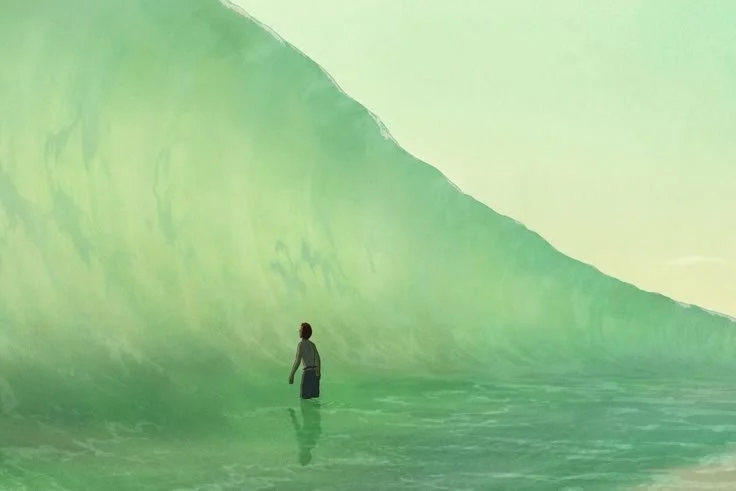49: Technofeudalism by Yanis Varoufakis
“Almost everyone today takes to capitalism as fish take to water -- without even noticing it is there, treating it as the invisible, irreplaceable, natural ether we move through. As Fredric Jameson famously put it, people find it easier to imagine the end of the world than the end of capitalism.”(Varoufakis 24)
The last days of May were spent writing and painting here and elsewhere, with a looming intention of addressing a book I’d recently read that threw me for a loop: Technofeudalism: What Killed Capitalism by Yanis Varoufakis. Ah yes, the light summer beach read you’ve been looking for!
You’re probably thinking, what do you mean Capitalism is dead? If capitalism is dead why am I not yet living out my off-grid cottagecore fantasy? Why doesn’t the world look like Animal Crossing? Isn’t it just late-stage? Hyper-capitalism? Well, I don’t really know, but I was listening to the Jacobin Radio podcast recently with Vivek Chibber and Melissa Naschek who discussed the topic succinctly:
Naschek: “At a certain point we’re gonna run out of later stages.”
Chibber: “In the 80s there was this term called late capitalism and Ernest Mandel wrote a book in the 70s called Late Capitalism and somehow it morphed into late stage and it makes it sound like it’s about to die or something, that it's in its final stages and we’re just watching it slowly curl up into a ball.”
Naschek: “But late stage, it’s metastasized capitalism.”
It sounds like a disease; a new meaning is given to the “big C”.
No matter what you want to name it, Yanis Varoufakis--a Greek economist and politician who is the Secretary-General of the Democracy in Europe Movement 2025 (DiEM25), a left-wing pan-European political party he co-founded in 2016--has identified a crucial diversion from the Capitalism we have known all our lives. Varoufakis argues that we have entered a kind of digital feudalism in which “cloud rent” has usurped market-driven profit as the main driving force of economic growth, not capital.
“Thus a vassal capitalist class grew from the fertile soil of the first cloud fief: the Apple Store[...]The result was a global smartphone industry with two dominant cloudalist corporations, Apple and Google, with the bulk of their wealth being produced by unwaged third-party developers, from whose sales they extracted a fixed cut. This is not profit. It is cloud rent, the digital equivalent of ground rent.”(128-9)
He goes on to elaborate on other service or product-based sites such as Amazon which came to monopolize the digital consumer landscape like the ultimate SEO black hole, pushing out or subsuming smaller, niche online storefronts.
“To think of it as hypercapitalism or rentier capitalism would be to miss this essential, defining principle. And to reflect the return of rent to its central role, I can think of no better name than technofeudalism.”(135)
That’s a lot to take in. It reminds me again of a quote from my blog post on going analog: “On the Big Social platforms, creators don’t own their community. Those relationships are ultimately controlled by Mark Zuckerberg, Sundar Pichai, the Chinese Communist Party, and Elon Musk. On those platforms, with some fringe exceptions, the only way creators can make money is through a share of the platform’s ad revenue or through deals with brands that want to sell stuff to their audiences. Those conditions determine what kind of creative work gets made, how it is shaped, and who gets the rewards.” - Hamish McKenzie
“Markets, the medium of capitalism, have been replaced by digital trading platforms which look like, but are not, markets, and are better understood as fiefdoms. And profit, the engine of capitalism, has been replaced with its feudal predecessor: rent. Specifically, it is a form of rent that must be paid for access to those platforms and to the cloud more broadly. I call it cloud rent.”(xi)
Let’s think of it in simple, storytime terms: There was once a little village where people made their own food, goods, and services. They bartered, mostly. As the village grew, it came into contact with other villages and they had to decide what exchange value their town wares had in relation to the other town wares. So someone invented coins and paper monies that people exchanged in place of valuable items/services to help solve this problem. They even decorated them with the faces of old white man colonizers scowling, how charming <3!
Then, because people began to lend money when perceived values didn’t line up or someone didn’t have enough, they invented interest which grew people’s debt the longer they took to pay it back (that’s called usury). When some people accrued too much debt, they went to debtors' prison, and feudal lords or the government usurped their land.
It became a crime to be poor. Morality and meritocracy became tied to wealth accumulation.
This led to the accumulation of feudal lands, and therefore landed wealth, in which people were born into families who inherited property through which they could rent out to people at whatever price for a profit. That was feudalism. In the United States, this happened after the genocide and displacement of the native people for the sake of “civilization” and “God’s will”. Then, as industrialization happened, people began to be able to invent goods and services to sell in markets under supply and demand, so they could accumulate wealth from profit as well as rent. That became capitalism. Many villages became cities. The cities became a free-for-all, some people liked it that way because it benefited them, but others were driven to leave or to destitution, often by no fault of their own.
Then, a tech bro villager invented the internet and the smartphone, and because he was the first to do it, he was able to monopolize the market that developed out of it. The tech bro villager built a cloud land in which virtual villagers could buy their way in, paying him virtual rent in order to have access to a monopolized audience. The tech bro villager then accumulated ungodly amounts of cloud capital and profit became irrelevant, because virtual rent and shareholding paid him more than the earthly realm could imagine. He became a tech broligarch and his creation became technofeudalism. This is decidedly not good.
This all happened after WWII when the United States had an insanely powerful postwar labor market and production was so efficient that they didn’t have enough consumers at home, so through the power of the Bretton Woods system, and later the television, they globalized the US dollar.
Varoufakis walks us through the major moments in the following six quotes:
“Drilling new desires into the American consumer could never be enough because there were not enough American middle-class homes to do the necessary consuming. Foreign markets had to be found.”(38)
“The financial project of the Bretton Woods system was bold: to ‘dollarise’ the currencies of Europe and Japan by linking European currencies and the yen to the dollar with fixed exchange rates[...]In essence, it was a global currency union based on the US dollar.”(40)
“From the war’s end (WWII) until 1971, America, Europe and Japan enjoyed low unemployment, low inflation, high growth and massively diminished inequality.”(41)
“Washington killed off its finest creation: on 15 August 1971, President Nixon announced the ejection of Europe and Japan from the dollar zone. Bretton Woods was dead.”(43)
“[...]Financial instruments such as options (or derivatives) - the weapons of potential mass financial destruction, as Warren Buffett called them - which were the occasion, if not the cause, of the immense financial bubble that burst in the calamity of 2008.”(44)
“But there was another reason why the dollar’s hegemony grew: the intentional impoverishment of America’s working class[...]For Wall Street to exercise fully its magnetic powers over foreign capital, profit margins in the United States had to catch up with profit rates in Germany and Japan. A quick and dirty way to do this was to suppress American wages: cheaper labour makes for lower costs makes for larger margins. It is no coincidence that, to this day, American working-class earnings languish, on average, below their 1974 level.”(49)
So, after all of that, and the invention of the “cloud fief” between 2008 and 2020, we are now not only fighting for wages to catch up to the cost of living, but also for our data and privacy rights. Data rights are human rights.
“As with the original Enclosures, some form of fence would be necessary to keep the masses out of such an important resource. In the eighteenth century, it was land that the many were denied access to. In the twenty-first century, it is access to our own identity.”(75)
Cue all of the implications of privacy infringement surrounding DOGE and Palantir, Musk and Thiel. Cue the fact that we’ve been trained to fear people not watching us as we post online instead of the other way around. It is an inverted Orwellian future we did not anticipate.
“Aided by machines, it was waged workers who produced the stuff that was sold to generate profits, which in turn financed their wages and the production of more machines - that’s how capital accumulated and reproduced. Cloud capital, in contrast, can reproduce itself in ways that involve no waged labour. How? By commanding almost the whole of humanity to chip in to its reproduction - for free!”(82)
Cue AI language models being trained off of classic literature without the permission of the copyright holders. Shannon Vallor, a tech philosopher and author of The AI Mirror (which I haven’t read yet), argues that “now, we have an era of innovation where the greatest opportunities the technologies create are for those already enjoying a disproportionate share of strengths and resources.”
Two popular examples are Amazon and Tesla: “During 2020, Amazon’s best year since its inception, when the pandemic-fuelled sales went through the roof, Bezo’s company booked sales worth $44 billion at its global headquarters in Ireland but paid exactly zero corporate tax because it posted not a cent of profits. Similarly with Tesla: even though its profit margins hovered just above zero, Tesla’s share price soared from around $90 at the beginning of 2020 to over $700 at year’s end[...]In an environment where profit had become optional, the cloudalists seized upon the central bank money to build a new empire.”(111)
After the 2008 crisis, banks and businesses were bailed out and given government funding in hopes of stimulating a floundering economy, which essentially led to giveaways to businesses that only served themselves. “Socialism for the financiers gave rise to another cluster of financial uber-lords to rival the cloudalists -- three US companies with powers exceeding those of private equity and all terrestrial capitalists put together: BlackRock, Vanguard and State Street. These three firms, the Big Three as they are known in financial circles, effectively own American capitalism.”(114)
“At the time of writing [2023], BlackRock manages nearly $10 trillion in investments, Vanguard $8 trillion and State Street $4 trillion. To make sense of these numbers: they are almost exactly the same as the US national income; or the sum of the national incomes of China and Japan; or the sum of the total income of the eurozone, the UK, Australia, Canada and Switzerland.”(114)
Did you know that? I didn’t. My jaw dropped when I read that. I had heard of BlackRock and Vanguard, not State Street. I knew there were some big corporations, but I didn’t know how big they were until years after they’d sunk their teeth into the shrinking hopes of American equity.
On top of this, because of the US Dollar’s historically exorbitant privilege which is beginning to crumble under an exploding trade deficit, China’s Yuan Renminbi (CNY) may usurp its place as the world currency within a decade. This is especially true because purchasing equity by way of real estate in the United States, Chinese financiers effectively own a large portion of corporate stock and land as a way for their USD to grow as investment. They also invented WeChat and AliPay, which eliminate middlemen banks on international payments that usually benefit by collecting transaction fees, further advancing Chinese capital advantage.
“Chinese cloud finance began little by little to establish itself as a viable alternative to the dollar-based international payments system[...]For the first time since 1971, the Dark Deal looked shaky. The dollar’s supremacy could no longer be taken for granted either by the world’s wealthy or by American policymakers.”(165)
What I have learned over the past year and months is that there is a growing cloud economy that seeks to profit off of our attention, free labor, and lack of ownership.
We need subscription streaming platforms to watch and pay more for ad-free. They no longer make laptops with CD/DVD readers (you must purchase to watch or listen, over and over, think of the 48 hour time limit to watch movies on Amazon, etc.). They are programming AI to anticipate our desires, recommend products, media, and more to our passively consuming eyes and ears. AI is also largely contingent upon the use of huge supercomputer data center facilities that not only draw a massive amount of power from subsequently overwhelmed local powergrids, but also require regular cooling from waterways that, as a result, become polluted.
“It is why I am anxious to convey, especially to the young, the disturbing news that the greater the power of the cloudalist class, and the faster the march of technofeudalism, the less we, the demos, can do to avert climate catastrophe. The young, who are at the forefront of ‘striking for the future’, must recognize that preventing our planet’s overheating goes hand in hand with resisting technofeudalism.”(173)
We can no longer take to capitalism as fish take to water. There was once a time in American history when our government sought to redistribute wealth during both the New Deal era and Vietnam Anti-War movement era as a direct result of the people rising up.
As we live through the rise of Technofeudalism, as Varoufakis calls it, we must rise against its maladaptions, dysregulation, and monopolization of the digital world.
Thank you for reading! Yes, I started this in June and haven’t posted it until late July. The summer is a doozy here and I am working 50+ hour weeks. If you read this far, you are one of the very few. So thank you.
Let me know you made it this far by commenting a heart or something below, otherwise I will assume I’ve continued writing into a void and will start saying weirder shit.
Gabby





